In September 2017, the SCOR Corporate Foundation for Science and the Paris School of Economics created a research chair in Macroeconomic Risk, which has since been renewed for two consecutive periods of three years.
It was last renewed for the period from 2024 to 2026.
The chair is held by PSE and headed by Gilles Saint-Paul (PSE, ENS) as Academic director and Riccardo Cioffi as Executive director.
Objective
Since 2008, three new global macroeconomic risks have emerged from the recurrent crises experienced by the world economy. These three risk areas will be the focus of the 2024 to 2026 SCOR-PSE chair:
1. Sustainability of fiscal and monetary policy in the post-crises world
First, the chair will focus on the challenges posed by the large level of public debt in major developed countries, inherited from the crisis management strategies in place since the 2008 financial crisis.
2. Growth and technological change, artificial intelligence, big data
Second, the potential acceleration of structural change driven by fast progress in automation, robotization, and artificial intelligence, remains a major concern, and the chair will continue to focus on these issues. Over the next three years, the chair will introduce a new perspective to better understand the interplay between these technological developments and the worrisome and paradoxical stagnation in productivity growth that has been experienced in recent decades.
3. Fragmentation
Third, the chair will study the redesigning of international flows in goods, financial resources and production factors which is likely to arise from recent geopolitical conflicts in Eastern Europe, the Middle East, and potentially Eastern Asia.
In addition to these three areas of particular interest, the chair will also maintain a focus on uncertainty, rare events, and systemic risk.
The SCOR-PSE Chair aims to promote high-level research and the dissemination of knowledge on a range of issues at the intersection of risk analysis and macroeconomic analysis.
General activities
The work of the chair includes:
• the development and promotion of scientific articles to be submitted for publication in top international journals;
• invitations to renowned international scholars to participate in teaching and research programs;
• the establishment of workshops and specific meetings between SCOR and PSE members;
• the organization of seminars, an annual lecture, and an annual conference to present and discuss work at the cutting edge of international research into macroeconomic risk;
• an annual webinar to present current research on macroeconomic risks, with a specific focus on the themes of the 2022-2024 Chair;
• an annual prize to reward a young researcher for excellence in their work.
Fields of research
Macroeconomics, economics of risk and uncertainty.
- Click here to read the 2024 SCOR-PSE Chair Activity report (in French)
- Click here to read the 2023 SCOR-PSE Chair Activity report (in French)
- Click here to read the 2021-2023 SCOR-PSE Chair Macroeconomic Risk Chair report (in English)
- Click here to read the 2022 SCOR-PSE Chair Activity report (in French)
- Click here to read the 2021 SCOR-PSE Chair Activity report (in French)
- Click here to read the 2019-2020 SCOR-PSE Chair activity report (in French)
Associate researchers
- Philippe Aghion (Collège de France, PSE)
- Agnès Bénassy-Quéré (Banque de France, PSE, University Paris 1)
- Tobias Broer (PSE, University Paris 1)
- Antoine Camous (Mannheim)
- Riccardo Cioffi (PSE)
- François Fontaine (PSE, University of Paris 1)
- Jean-Olivier Hairault (PSE, University Paris 1)
- Francesco Pappada (Venice, PSE)
- Facundo Piguillem (Einaudi Institute for Economics and Finance)
- Ariell Reshef (PSE, CNRS)
- Gilles Saint-Paul (PSE, ENS)
- Jean-Marc Tallon (PSE, CNRS)
Click here to access the SCOR-PSE Annual Activity Report
SCOR-PSE Chair Research
- Newsletter #18, January 2026
- Newsletter #17, September 2025
- Newsletter #16, January 2025
- Newsletter #15, September 2024
- Newsletter #14, April 2024
- Newsletter #13, December 2023
- Newsletter #12, July 2023
- Newsletter #11, February 2023
- Newsletter #10, October 2022
- Newsletter #9, May 2022
- Newsletter #8, January 2022
- Newsletter #7, September 2021
- Newsletter #6, December 2020
- Newsletter #5, September 2020
- Newsletter #4, April 2020
- Newsletter #3, December 2019
- Newsletter #2, June 2019
- Newsletter #1, December 2018
Click here to access all SCOR-PSE chair newsletters
- WP n°2024-12 - Geography Versus Income: The Heterogeneous Effects of Carbon Taxation
- WP n°2024-11 - The Flight to Safety and International Risk Sharing
- WP n°2023-10 - Tail Risk in Production Networks
- WP n°2023-09 - Efficient Allocations under Ambiguous Model Uncertainty
- WP n°2022-08 - The Curious Incidence of Monetary Policy Across the Income Distribution
- WP n°2022-07 - Exchange rate policy and firm heterogeneity
- WP n°2022-06 - Herding through Booms and Busts
- WP n°2021-05 - Sovereign default and imperfect tax enforcement
- WP n°2020-04 - Waiting for the Prince Charming: Fixed-Term Contracts as Stopgaps By Normann Rion (Paris School of Economics, ENS-PSL)
- WP n°2020-03 - Financial Cycles with Heterogeneous Intermediaries
- WP n°2019-02 - From Microeconomic Favoritism to Macroeconomic Populism
- WP n°2019-01 - Trading ambiguity: a tale of two heterogeneities
Click here to access all SCOR-PSE Working Papers
More information about the SCOR-PSE Chair
SCOR-PSE Chair Conference
- SCOR-PSE Annual Lecture of the "Macroeconomic Risk" Chair, December 3, 2025
• "The Effects of Monetary Policy: Consumption Theory with Measured Expectations" | Presentation - SCOR-PSE Annual Conference of the “Macroeconomic Risk” Chair (PSE Macro Days 2024), September 19, 2024 | Click here for more information
• "The Economic Consequences of Geopolitical Fragmentation: Evidence from the Cold War" | Presentation
• "Training Time, Robots and Technological Unemployment" | Presentation
• "International Trade and Macroeconomic Dynamics With Sanctions" | Presentation
• "The Impact of Bretton Woods International Capital Controls on the Global Economy and the Value of Geopolitical Stability" | Presentation
• "Dynamic Effects of Industrial Policies Amidst Geoeconomic Tensions" | Presentation - SCOR-PSE Annual Conference of the “Macroeconomic Risk” Chair (PSE Macro Days 2023), October 16, 2023 | Click here for more information
Click here to watch the replay - SCOR-PSE Annual Conference of the “Macroeconomic Risk” Chair (PSE Macro Days 2022), September 15, 2022 | Click here for more information
- SCOR-PSE Annual Conference of the “Macroeconomic Risk” Chair (PSE Macro Days 2021), September 17, 2021 | Click here for more information | Click here to watch the replay
- SCOR-PSE Chair Conference: Online PSE Annual Macro Meeting, September 17, 2020 | Click here to watch the replay
- Annual SCOR-PSE Chair Conference, July 2, 2019
- Inaugural SCOR-PSE Chair Conference, June 15, 2018
- Annual Conference: “Sovereign Debt and Risks”, June 2-3, 2016
- Annual Conference: “Risk, Uncertainty and Macroeconomics”, June 12-13, 2015
SCOR-PSE Chair Lecture
- Lecture by Anton Korinek and Donghyun Suh: "Scenarios for the Transition to AGI" & "Scenario Planning for an A(G)I Future", November 14, 2024
| Click here for more information - Lecture by Olivier Jeanne: “Should central banks backstop government debt?”, June 1, 2023 | Click here for more information
- Lecture by Laura Veldkamp: “Data and the changing economics of knowledge production”, May 19, 2022 | Click here to watch the replay
- Lecture by Ricardo Reis: "Is an inflation disaster around the corner?", October 20, 2021 | Click here to watch the replay
- Lecture by Luigi Zingales "Can Democracy Survive a Concentrated Economy?", June 7, 2021 | Click here to watch the replay
- Lecture SCOR-PSE - Jesus Fernandez-Villaverde , April 28-29, 2020 | Click here to watch the replay
- Lecture by Nicolas Bloom "Why do Stock Markets Jump (and Trump’s Impact on Markets)", December 5, 2019 | Click here to watch the replay
SCOR-PSE Chair Roundtable
- SCOR-PSE Chair: Online Roundtable - Macroeconomic consequences of Coronavirus crisis, On May 4, 2020 | Click here to watch the replay
SCOR-PSE Chair Workshop
- Workshop “Housing and the Economy”, December 15, 2022 | Click here for more information
- Workshop on Risks posed by China to the Global Economy, January 17, 2020
- Annual Workshop: “Modelling of Economic Scenarios and their Impact on Capital Management”, April 23, 2015
- Annual Workshop: “Yield Curve between Economics and Finance”, July, 2014
Click here to consult all Chair events and associated information.
2024 Junior Research Prize
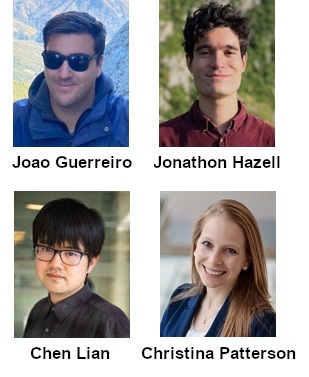
The SCOR-PSE Chair awarded the 2024 Junior Research Prize Joao Guerreiro (UCLA), Jonathon Hazell (LSE), Chen Lian (UC Berkeley), and Christina Patterson (UChicago).
Click here to read the news.
2023 Junior Research Prize
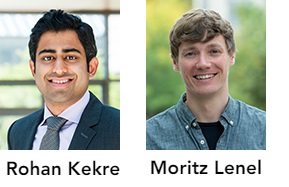
The SCOR-PSE Chair awarded the 2023 Junior Research Prize to Rohan Kekre, (the University of Chicago Booth School of Business) and Moritz Lenel, (Princeton University).
Click here to read the news.
2022 Junior Research Prize
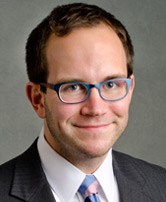
The SCOR-PSE Chair awarded the 2022 Junior Research Prize to Ian Dew-Becker, Associate Professor of Finance at the Kellogg School of Management, Northwestern University.
Click here to read the news.
2021 Junior Research Prize
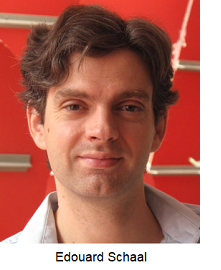 The SCOR-PSE Chair, created in 2018 by the SCOR Foundation for Science and the Paris School of Economics (PSE), has presented its 2021 Junior Research Prize to Edouard Schaal and Mathieu Taschereau-Dumouchel, respectively Research Professor at CREI (Centre de Recerca en Economia International) and Assistant Professor of Economics at Cornell University. The award ceremony took place online on Thursday, March 24, 2022, and was followed by a presentation of the winning paper “Herding Through Booms and Busts” by the authors. The judging panel was headed by Gilles Saint-Paul, professor at ENS and PSE, and scientific director of the Chair.
The SCOR-PSE Chair, created in 2018 by the SCOR Foundation for Science and the Paris School of Economics (PSE), has presented its 2021 Junior Research Prize to Edouard Schaal and Mathieu Taschereau-Dumouchel, respectively Research Professor at CREI (Centre de Recerca en Economia International) and Assistant Professor of Economics at Cornell University. The award ceremony took place online on Thursday, March 24, 2022, and was followed by a presentation of the winning paper “Herding Through Booms and Busts” by the authors. The judging panel was headed by Gilles Saint-Paul, professor at ENS and PSE, and scientific director of the Chair.
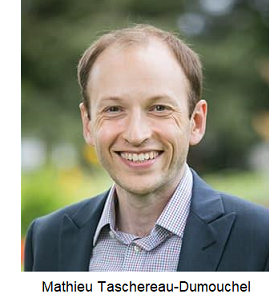
Business cycle history is replete with examples in which new technologies have led to periods of massive investment that ended in severe economic downturns. One salient example is the 1990s boom in information technologies that culminated in the stock market crash of 2001 (“dot-com bubble”). While extreme enthusiasm about new technologies was initially fueled by the high volume of investment and rising valuations of IT companies, a crash eventually followed as some of the expected returns failed to materialize. Recent technological advances have reignited the debate over the potential negative spillovers that innovations can have on macroeconomic stability.
Click here to read the press release.
2020 Young Researcher Award
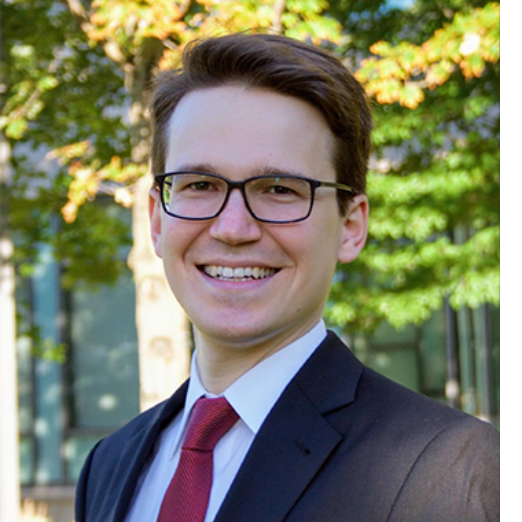
The selection committee headed by Gilles Saint-Paul, scientific director of the SCOR-PSE Chair, has decided to award this year’s prize to Ludwig Straub and Robert Ulbricht, respectively Assistant Professor at Harvard and Assistant Professor at Boston College. The award is in recognition of their work titled "Endogenous Uncertainty and Credit Crunches”. In this paper, Ludwig and Robert develop a model with uncertainty and financial frictions to understand why financial crises usually generate large and persistent economic contractions.
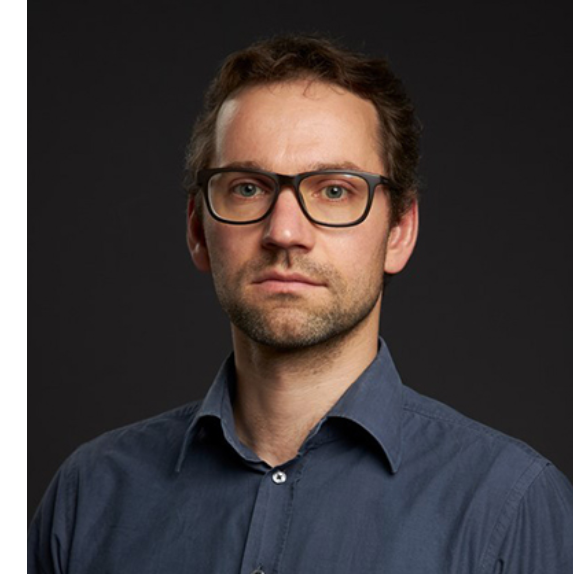
At the heart of the paper lies the idea that greater uncertainty and bad economic conditions reinforce each other, channeled through financial constraints and learning dynamics. An initial tightening of credit constraints restricts firms’ access to funding: Some firms exit, which results in an increase in uncertainty as investors cannot learn about the productivity of inactive firms. Increased uncertainty fuels investors’ pessimism, which restricts even more firms’ access to funding, and further amplifies the recession. Taken together, this model explains why a temporary financial shock can develop into a large and persistent “funding freeze”. The paper, which highlights the role played by the interaction of informational and financial frictions, also has important policy implications: for instance, direct transfers to firms should be favored over banks’ recapitalization.
Click here to read the press release.
2019 Young Researcher Award
The selection committee headed by Gilles Saint-Paul, scientific director of the SCOR-PSE Chair, has decided to award this year’s prize to Maryam Farboodi, Assistant Professor of Finance at the MIT Sloan School of Management for her recent paper titled “International and Voluntary Exposure to Counterparty Risk”. In this paper, Maryam develops a model of the financial sector in which endogenous intermediation among debt-financed banks generates excessive systemic risk.
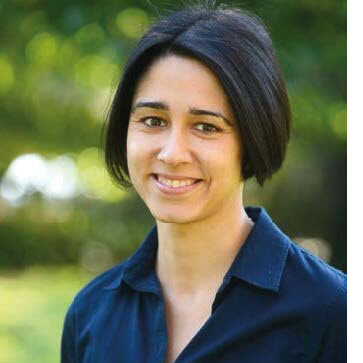
There is overwhelming evidence that interbank markets exhibit a core-periphery structure, which may increase systemic risk. In line with this observation, this work provides a new theoretical framework to analyze the endogenous formation of networks in the financial sector. Maryam then shows that the interbank network generated by the model is socially inefficient: Banks who make risky investments overconnect, exposing themselves to excessive counterparty risk, while banks who mainly provide funding end up with too few connections. Overall, her work suggests that explicitly modeling the interaction between banks’ incentives to capture higher returns, with intermediation, a necessary mechanism to allocate liquidity within the financial system, jointly explains the stylized facts about the global structure of interbank networks, interbank interconnectedness, and gross and net exposures among financial institutions. Moreover, by providing sharp predictions about sources of inefficiency in interbank relationships, the model contributes to the heated policy debate on how to regulate the financial market.
Click here to read the press release.
- SCOR-PSE Macroeconomic Risk Chair - Junior Research Prize (2024) (15.09.2025)
- SCOR-PSE Macroeconomic Risk Chair - Junior Research Prize (2023) (11.03.2024)
- SCOR-PSE Macroeconomic Risk Chair Annual Lecture (2023) (26.06.2023)
- SCOR-PSE Macroeconomic Risk Chair Newsletter #9 (19.05.2022)
- SCOR-PSE Macroeconomic Risk Chair, 2020 | Young Researcher Award (07.05.2020)
- SCOR-PSE Macroeconomic Risk Chair, 2019 | Young Researcher Award (03.07.2019)
- SCOR-PSE Macroeconomic Risk Chair, First Annual Conference on Macroeconomic Risks (27.06.2018)
- SCOR-PSE Macroeconomic Risk Chair, Creation of a chair on Macroeconomic Risk with the Paris School of Economics (PSE) (06.06.2018)